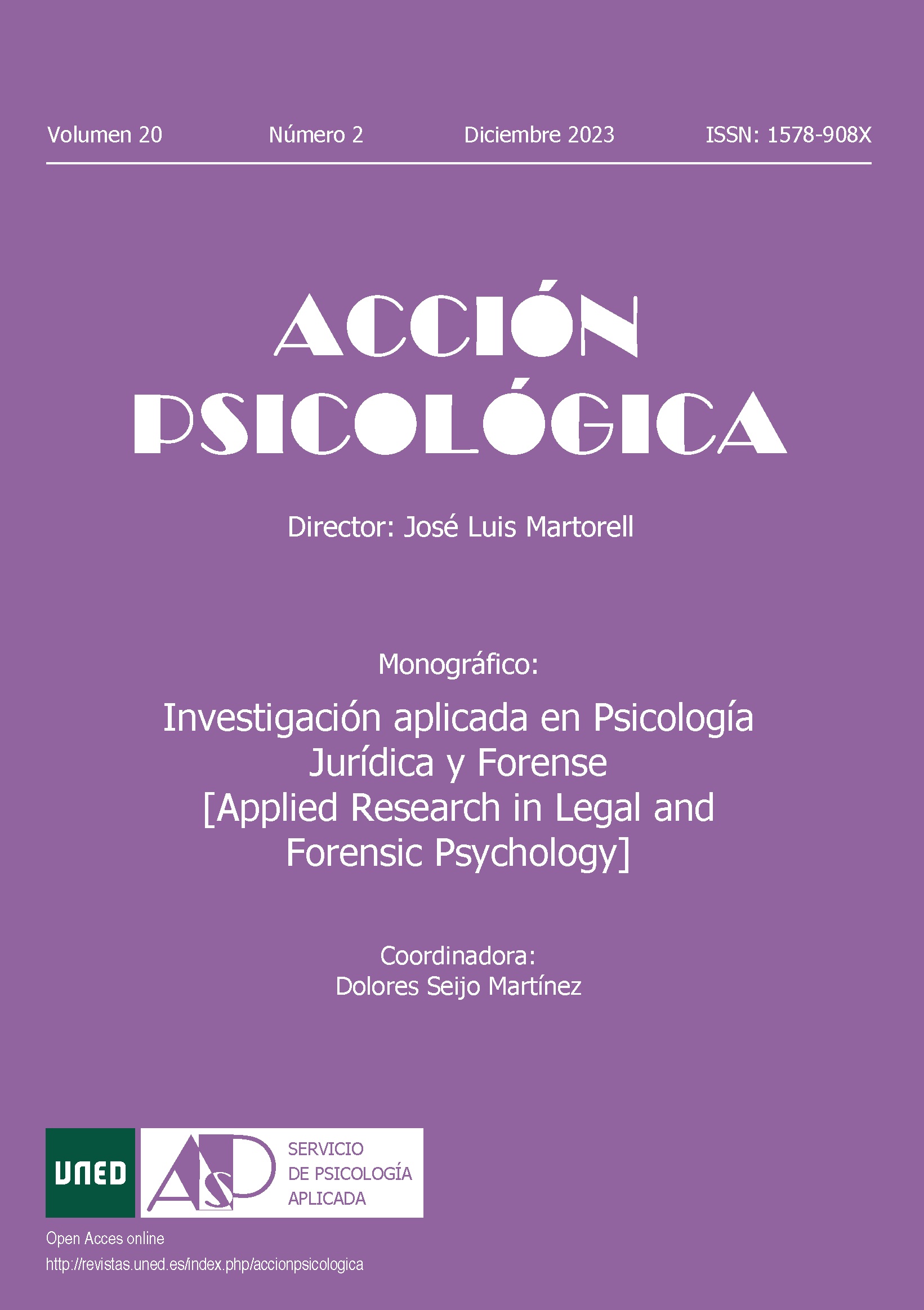Does a Short Relaxation Session Affect Inhibitory Control of the Stroop task in adolescents?
Sesión corta de relajación en control inhibitorio
DOI:
https://doi.org/10.5944/ap.20.2.37533Keywords:
Inhibitory Control, Resistance to Interference, Relaxation, Stroop taskAbstract
Some studies have indicated that a relaxation and/or meditation session could affect inhibitory control, while other studies have not found such an effect. Given the discrepancy between studies, the objective of the present article was to examine whether or not a short relaxation session could influence inhibitory control. Method: A total of 60 students aged between 16-18 years participated in the study, randomly distributed into two groups, according to the experimental (relaxation session) and the control (listening to neutral material) condition. They were given an individual session with the recording (relaxation/neutral material for approximately 7 min.) between the pre and post Stroop task. Results: No significant improvements were found in the experimental group compared to the control group in Resistance to Interference. Conclusions: These results suggest that some prior relaxation practice might be necessary for a short relaxation session to have immediate benefits in inhibitory control or/and that the relaxation session should last longer.
Downloads
References
Basten, U., Stelzel, C. y Fiebach, C. J. (2011). Trait Anxiety Modulates the Neural Efficiency of Inhibitory Control. Journal of Cognitive Neuroscience, 23(10), 3132–3145. https://doi.org/10.1162/jocn_a_00003
Booth, R. W. y Peker, M. (2017). State Anxiety Impairs Attentional Control when other Sources of Control are Minimal. Cognition and Emotion, 31(5), 1004–1011. https://doi.org/10.1080/02699931.2016.1172474
Cahn, B. R. y Polich, J. (2006). Meditation States and Traits: EEG, ERP, and Neuroimaging Studies. Psychological Bulletin, 132(2), 180–211. https://doi.org/10.1037/0033-2909.132.2.180
Eysenck, M. W., Derakshan, N., Santos, R. y Calvo, M. G. (2007). Anxiety and Cognitive Performance: Attentional Control Theory. Emotion, 7(2), 336– 353. https://doi.org/10.1037/1528-3542.7.2.336
Foris, D. (2005). The effect of Meditation. Journal of Undergraduate Research, 8, 1–4.
Fan, Y., Tang, Y. Y., Tang, R. y Posner, M. I. (2015). Time Course of Conflict Processing Modulated by Brief Meditation Training. Frontiers in Psychology, 6, Artículo 911. https://doi.org/10.3389/fpsyg.2015.00911
Golden, C. J. (2020). Stroop. Test de Colores y Palabras – Edición Revisada (Adapt.: B. Ruiz-Fernández, T. Luque y F. Sánchez-Sánchez). TEA.
Gutiérrez-Martínez, F., Ramos-Ortega, M., & Vila-Chaves, J. Ó. (2018). Executive Efficacy on Stroop Type Interference Tasks. A Validation Study of a Numerical and Manual Version (CANUM). Anales de Psicología, 34(1), 184–196. https://doi.org/10.6018/analesps.34.1.263431
Friedman, N. P., & Miyake, A. (2004). The Relations among Inhibition and Interference Control Functions: A Latent-Variable Analysis. Journal of Experimental Psychology: General, 133(1), 101–135. https://doi.org/10.1037/0096-3445.133.1.101
Hayes, S. C., Wilson, K. G., Gifford, E. V., Bissett, R., Piasecki, M., Batten, S. V., Byrd, M. y Gregg, J. (2004). A Preliminary Trial of Twelve-Step Facilitation and Acceptance and Commitment Therapy with Polysubstance-Abusing Methadonemaintained Opiate Addicts. Behavior Therapy, 35(4), 667–688. https://doi.org/10.1016/S0005-7894(04)80014-5
Isbel, B., Lagopoulos, J., Hermens, D., Stefanidis, K. y Summers, M. J. (2020). Mindfulness Improves Attention Resource Allocation during Response Inhibition in Older Adults. Mindfulness, 11(6), 1500–1510. https://doi.org/10.1007/s12671-020-01364-z
Kane, M. J. y Engle, R. W. (2003). Working-memory Capacity and the Control of Attention: The Contributions of Goal Neglect, Response Competition, and Task Set to Stroop Interference. Journal of Experimental Psychology: General, 132(1), 47–70. https://doi.org/10.1037/0096-3445.132.1.47
Luu, K. y Hall, P. A. (2017). Examining the Acute Effects of Hatha Yoga and Mindfulness Meditation on Executive Function and Mood. Mindfulness, 8(4), 873–880. https://doi.org/10.1007/s12671-016-0661-2
Mirabella, G. (2021). Inhibitory Control and Impulsive Responses in Neurodevelopmental Disorders. Developmental Medicine & Child Neurology, 63(5), 520–526. https://doi.org/10.1111/dmcn.14778
Öst, L. G. (2008). Efficacy of the Third Wave of Behavioral Therapies: A Systematic Review and Meta-Analysis. Behaviour Research and Therapy, 46(3), 296–321. https://doi.org/10.1016/j.brat.2007.12.005
Pizzoli, S. F. M., Marzorati, C., Mazzoni, D. y Pravettoni, G. (2020). Web-based Relaxation Intervention for Stress during Social Isolation: Randomized Controlled Trial. JMIR Mental Health, 7(12), Artículo e22757. https://doi.org/10.2196/19236
Ríos-Lago, M., & Periáñez, J. A. (2010). Attention and Speed of Information Processing. En Encyclopedia of Behavioral Neuroscience (pp. 109–117). Academic Press. https://doi.org/10.1016/B978-0-08-045396-5.00208-6
Scarpina, F. y Tagini, S. (2017). The Stroop Color and Word Test. Frontiers in Psychology, 8, Artículo 557. https://doi.org/10.3389/fpsyg.2017.00557
Telles, S., Singh, N., Bhardwaj, A. K., Kumar, A. y Balkrishna, A. (2013). Effect of Yoga or Physical Exercise on Physical, Cognitive, and Emotional Measures in Children: A Randomized Controlled Trial. Child and Adolescent Psychiatry and Mental Health, 7(1), 1–16. https://doi.org/10.1186/1753-2000-7-37
Vaitl, D., Birbaumer, N., Gruzelier, J., Jamieson, G. A., Kotchoubey, B., Kübler, A., Lehmann, D., Miltner, W. H. R., Ott, U., Pütz, P., Sammer, G., Strauch, I., Strehl, U., Wackermann, J. y Weiss, T. (2005). Psychobiology of Altered States of Consciousness. Psychological Bulletin, 131(1), 98–127. https://doi.org/10.1037/0033-2909.131.1.98
Wagener, B. (2013). Autogenic Training, Metacognition, and Higher Education. Educational Psychology, 33(7), 849–861. https://doi.org/10.1080/01443410.2013.785051
Wenk-Sormaz, H. (2005). Meditation can Reduce Habitual Responding. Alternative Therapies in Health and Medicine, 11(2), 42–58.
Downloads
Published
How to Cite
Issue
Section
License
Copyright (c) 2023 Faculty of Psychology. Applied Psychology Service (UNED)

This work is licensed under a Creative Commons Attribution-NonCommercial 4.0 International License.
Accion Psicologica is published under Creative Commons Attribution-Non Commercial (CC BY-NC). The opinions and contents of the articles published in Acción Psicológica are responsibility of the authors and do not compromise the scientific and political opinion of the journal. Authors are also responsible for providing copies of the raw data, ratings, and, in general, relevant experimental material to interested readers.












